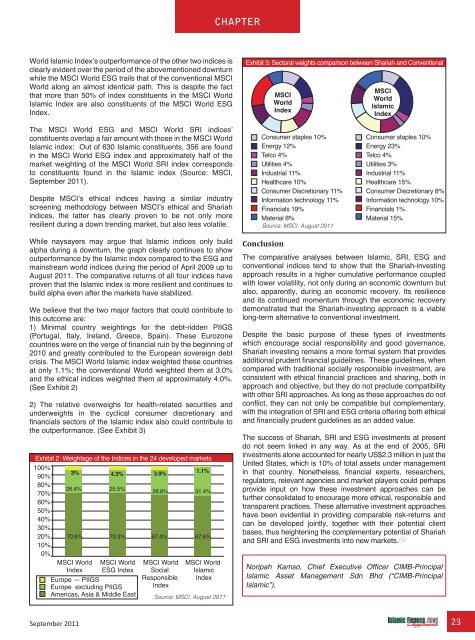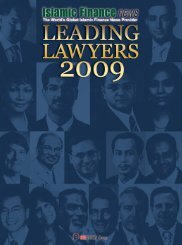Islamic Investor: Islamic Investor: - Islamic Finance News
Islamic Investor: Islamic Investor: - Islamic Finance News
Islamic Investor: Islamic Investor: - Islamic Finance News
Create successful ePaper yourself
Turn your PDF publications into a flip-book with our unique Google optimized e-Paper software.
CHAPTER<br />
World <strong>Islamic</strong> Index’s outperformance of the other two indices is<br />
clearly evident over the period of the abovementioned downturn<br />
while the MSCI World ESG trails that of the conventional MSCI<br />
World along an almost identical path. This is despite the fact<br />
that more than 50% of index constituents in the MSCI World<br />
<strong>Islamic</strong> Index are also constituents of the MSCI World ESG<br />
Index.<br />
<br />
<br />
<br />
<br />
<br />
<br />
<br />
<br />
The MSCI World ESG and MSCI World SRI indices’<br />
constituents overlap a fair amount with those in the MSCI World<br />
<strong>Islamic</strong> index: Out of 630 <strong>Islamic</strong> constituents, 356 are found<br />
in the MSCI World ESG index and approximately half of the<br />
market weighting of the MSCI World SRI index corresponds<br />
to constituents found in the <strong>Islamic</strong> index (Source: MSCI,<br />
September 2011).<br />
Despite MSCI’s ethical indices having a similar industry<br />
screening methodology between MSCI’s ethical and Shariah<br />
indices, the latter has clearly proven to be not only more<br />
resilient during a down trending market, but also less volatile.<br />
<br />
<br />
<br />
<br />
<br />
<br />
<br />
<br />
<br />
<br />
Source: MSCI, August 2011<br />
<br />
<br />
<br />
<br />
<br />
<br />
<br />
<br />
<br />
<br />
While naysayers may argue that <strong>Islamic</strong> indices only build<br />
alpha during a downturn, the graph clearly continues to show<br />
outperformance by the <strong>Islamic</strong> index compared to the ESG and<br />
mainstream world indices during the period of April 2009 up to<br />
August 2011. The comparative returns of all four indices have<br />
proven that the <strong>Islamic</strong> index is more resilient and continues to<br />
build alpha even after the markets have stabilized.<br />
We believe that the two major factors that could contribute to<br />
this outcome are:<br />
1) Minimal country weightings for the debt-ridden PIIGS<br />
(Portugal, Italy, Ireland, Greece, Spain). These Eurozone<br />
countries were on the verge of fi nancial ruin by the beginning of<br />
2010 and greatly contributed to the European sovereign debt<br />
crisis. The MSCI World <strong>Islamic</strong> index weighted these countries<br />
at only 1.1%; the conventional World weighted them at 3.0%<br />
and the ethical indices weighted them at approximately 4.0%.<br />
(See Exhibit 2)<br />
2) The relative overweighs for health-related securities and<br />
underweights in the cyclical consumer discretionary and<br />
fi nancials sectors of the <strong>Islamic</strong> index also could contribute to<br />
the outperformance. (See Exhibit 3)<br />
<br />
<br />
<br />
<br />
<br />
<br />
<br />
<br />
<br />
<br />
<br />
<br />
<br />
<br />
<br />
<br />
<br />
<br />
<br />
<br />
<br />
<br />
<br />
<br />
<br />
<br />
<br />
<br />
<br />
<br />
<br />
<br />
<br />
<br />
<br />
<br />
<br />
<br />
Source: MSCI, August 2011<br />
Conclusion<br />
The comparative analyses between <strong>Islamic</strong>, SRI, ESG and<br />
conventional indices tend to show that the Shariah-investing<br />
approach results in a higher cumulative performance coupled<br />
with lower volatility, not only during an economic downturn but<br />
also, apparently, during an economic recovery. Its resilience<br />
and its continued momentum through the economic recovery<br />
demonstrated that the Shariah-investing approach is a viable<br />
long-term alternative to conventional investment.<br />
Despite the basic purpose of these types of investments<br />
which encourage social responsibility and good governance,<br />
Shariah investing remains a more formal system that provides<br />
additional prudent fi nancial guidelines. These guidelines, when<br />
compared with traditional socially responsible investment, are<br />
consistent with ethical fi nancial practices and sharing, both in<br />
approach and objective, but they do not preclude compatibility<br />
with other SRI approaches. As long as these approaches do not<br />
conflict, they can not only be compatible but complementary,<br />
with the integration of SRI and ESG criteria offering both ethical<br />
and financially prudent guidelines as an added value.<br />
The success of Shariah, SRI and ESG investments at present<br />
do not seem linked in any way. As at the end of 2005, SRI<br />
investments alone accounted for nearly US$2.3 million in just the<br />
United States, which is 10% of total assets under management<br />
in that country. Nonetheless, financial experts, researchers,<br />
regulators, relevant agencies and market players could perhaps<br />
provide input on how these investment approaches can be<br />
further consolidated to encourage more ethical, responsible and<br />
transparent practices. These alternative investment approaches<br />
have been evidential in providing comparable risk-returns and<br />
can be developed jointly, together with their potential client<br />
bases, thus heightening the complementary potential of Shariah<br />
and SRI and ESG investments into new markets.<br />
Noripah Kamso, Chief Executive Offi cer CIMB-Principal<br />
<strong>Islamic</strong> Asset Management Sdn Bhd (“CIMB-Principal<br />
<strong>Islamic</strong>”).<br />
September 2011 23

















